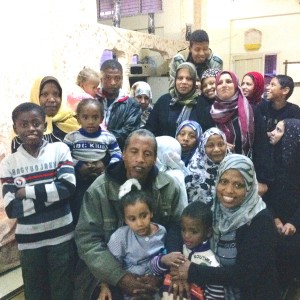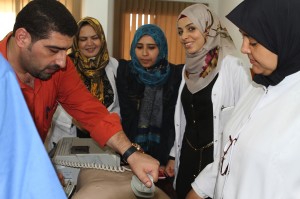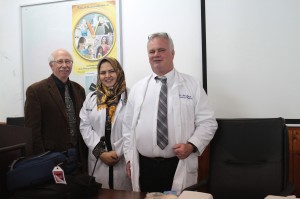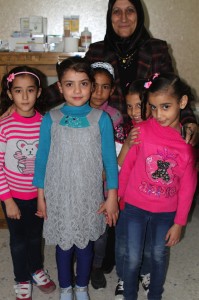Day four in Gaza by Gerri Haynes
(Washington Physicians for Social Responsibility has traveled to Gaza since 1993. Since 2009, following the Cast Lead invasion by Israel, WPSR has sponsored eight medical delegations to serve the besieged, imprisoned and war-torn people of Gaza.)Yesterday afternoon, I met with a group of women I’ve talked with in my last three or four visits to Gaza. These women, all mothers, tell me how life is now for them.
The war this summer was terrible – worse than any other in their memory. There seemed to be no end to it and everyone experienced the death or serious injury of someone close to them.
As refugees, these women receive assistance from UNRWA, but they report that UNRWA is now underfunded. The food assistance they used to receive has been cut in half and the financial assistance that had been 100 USD/month was cut to 80 USD/month and now is zero. Food is scarce and life is tenuous. The bombs this summer did not strike them, but they were close enough to rattle the windows of their homes and they continue to fear what might be yet to come.
As we talked, the room filled with children who were curious and friendly – the older children picking upthe younger and carrying them around the room. The front door remained open, allowing light to filter in from the street – the electricity is cut for at least 12 hours each day and my visit was in an electricity-free time.
Bill Dienst and Bob Haynes continue to teach advanced cardiac life support classes every day. Bob reports that their students are enthusiastic and the classes are fun to teach. The students have so far been members of the staff at Shifa hospital. Tomorrow, Bob and Bill will be assisted by faculty to teach a large group of medical students. On Saturday, their classes will be for nursing students from Islamic University.
This morning, several of us traveled to the Palestine Future Association – the Gaza Center for Cerebral Palsy – to meet with Dr. Al Kashif, Director. This inspiring man walks through rooms of children, gently touching heads or arms and receiving brilliant smiles of recognition and care.
The Center cares for all children in Gaza who have cerebral palsy – speech therapists, physical therapists, teachers of many special areas care tenderly for individual children and for integrated groups.
We were invited to dance with the children – several of them in wheel chairs. We had a lovely time and were inspired by monumental work being done in an environment affected – as is all of Gaza – by the siege. More equipment is needed. We brought gifts of Ipads to help the older children in developing computer skills.
We stopped at a kindergarten to donate some of the books and learning supplies that were given to us to bring to Gaza and we were
treated to Debka dancing by a wonderful group of 5 – 6 year olds, who also invited us to join them in their dance. One of the girls danced beautifully but did not smile. Her parents were killed in separate wars.This afternoon, we visited the Al Amal orphanage. The only orphanage in Gaza, Al Amal shelters 120 boys and girls from 5 years to late teens. This summer’s disaster left 1700 more children orphaned – adding to the 22,000 already needing care.
Most orphans are cared for in their families, but for some this is not possible and Al Amal serves as many as possible both in the facility and by visiting in homes. A much larger facility is needed! This facility is immaculately clean. Each child is responsible for maintaining her/his living space and food is prepared in a spotless kitchen.
Psychological support, physical education and cultural activities are provided on site and the children attend UNRWA schools. Still, the numbers of children needing care are overwhelming and the traumatized children who became orphans this summer require special attention. They are the unpublicized victims of war.
RSS feed for comments on this post. TrackBack URI



